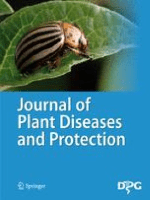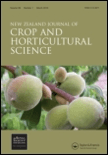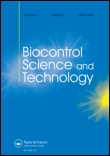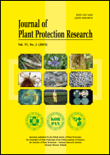
Journal of Plant Diseases and Protection
Scope & Guideline
Empowering Research for a Greener Tomorrow
Introduction
Aims and Scopes
- Plant Pathology and Disease Management:
Research related to the identification, characterization, and management of plant diseases caused by fungi, bacteria, viruses, and nematodes, emphasizing integrated approaches to disease control. - Pest Management Strategies:
Studies focusing on the ecology and management of agricultural pests, including the use of biological control agents, botanical pesticides, and synthetic chemicals, to develop sustainable pest management practices. - Molecular and Genetic Studies:
Research utilizing molecular techniques to understand plant-pathogen interactions, pathogen evolution, and genetic resistance in plants, contributing to the development of resistant varieties. - Ecological Impact Assessment:
Investigations into the ecological consequences of pest and disease management practices, including the effects on non-target organisms and the environment. - Innovative Technologies in Agriculture:
Application of novel technologies such as machine learning, imaging techniques, and bioinformatics in the diagnosis and management of plant diseases and pests. - Sustainability and Agroecology:
Research promoting sustainable agricultural practices, including the use of organic amendments, biopesticides, and ecological approaches to enhance plant health and productivity.
Trending and Emerging
- Biological Control and Eco-Friendly Approaches:
A growing trend towards research on biological control agents, including entomopathogenic fungi and bacteria, as well as the use of plant-derived pesticides, is evident as the agricultural community seeks sustainable alternatives to chemical control. - Precision Agriculture and Technology Integration:
There is an increasing focus on the integration of technology in agriculture, including the use of machine learning, remote sensing, and precision application techniques for disease detection and pest management. - Genomics and Molecular Tools:
Emerging research utilizing genomic and molecular tools to enhance understanding of plant-pathogen interactions and develop genetically resistant plant varieties is gaining traction. - Climate Change Impact Studies:
Research exploring the effects of climate change on plant diseases and pest dynamics is becoming more prominent, reflecting the need to address future agricultural challenges. - Interdisciplinary Approaches to Crop Protection:
A trend towards interdisciplinary research that combines insights from plant pathology, entomology, and ecology is emerging, promoting comprehensive strategies for managing plant health.
Declining or Waning
- Traditional Chemical Pesticides:
There is a noticeable decline in studies focusing solely on conventional chemical pesticides, as the research community shifts towards integrated pest management and eco-friendly alternatives. - Local and Regional Case Studies:
Research centered exclusively on localized pest or disease outbreaks is less prevalent, perhaps overshadowed by broader studies and meta-analyses that offer global perspectives. - Basic Agronomy Research:
Studies focusing solely on fundamental agronomic practices without a direct link to disease or pest management are becoming less common, as the emphasis moves towards integrated approaches.
Similar Journals

NEW ZEALAND JOURNAL OF CROP AND HORTICULTURAL SCIENCE
Transforming Agriculture with Cutting-edge ResearchThe New Zealand Journal of Crop and Horticultural Science, published by Taylor & Francis Ltd, stands as a key resource in the fields of Agronomy and Horticulture, with a commendable impact factor reflecting its quality and influence in the scientific community. Since its inception in 1989, this journal has been committed to advancing our understanding of crop development and horticultural practices, catering not only to researchers and professionals but also to students eager to delve into the intricacies of plant sciences. With a Q3 ranking in both Agronomy and Crop Science and Horticulture as of 2023, the journal occupies a significant position within the agricultural and biological sciences domain, significantly contributing to the body of knowledge in these fields. The journal features original research, reviews, and technical notes that cover a wide range of topics, ensuring a comprehensive perspective on contemporary and emerging agricultural issues. For individuals interested in accessing cutting-edge research, the journal provides subscription-based access, further enhancing its scholarly contributions.

BIOCONTROL SCIENCE AND TECHNOLOGY
Pioneering Insights for Tomorrow’s Pest Management ChallengesBIOCONTROL SCIENCE AND TECHNOLOGY is a premier, peer-reviewed journal published by Taylor & Francis Ltd that specializes in the dynamic fields of Agronomy and Insect Science. Established in 1991, this journal has garnered a reputation for disseminating high-quality, impactful research with an impressive 2023 Scopus rank of 53 out of 181 in Insect Science and 153 out of 406 in Agronomy, placing it in the Q2 category for both fields. With its ISSN 0958-3157 and E-ISSN 1360-0478, the journal serves as a vital resource for researchers, professionals, and students dedicated to advancing understanding and innovation in pest management and biocontrol strategies. Although not an open-access journal, it offers comprehensive insights that are crucial for professionals aiming to tackle agricultural challenges and enhance food security. The journal’s continuous coverage from 1991 to 2024 ensures that it remains at the forefront of significant advancements in biocontrol, making it an essential read for anyone interested in sustainable agricultural practices and integrated pest management.

JOURNAL OF PLANT PROTECTION RESEARCH
Championing global access to vital agricultural discoveries.JOURNAL OF PLANT PROTECTION RESEARCH is a pivotal publication in the realm of agricultural sciences, dedicated to advancing our understanding of plant protection and pest management. Published by the INST OCHRONY ROSLIN, PANSTWOWY INST BADAWCZY in Poland, this journal has been an open-access venue since 2008, ensuring that research findings are readily accessible to a global audience. With an ISSN of 1427-4345 and E-ISSN of 1899-007X, it serves as a crucial platform for scholars and practitioners in the fields of Agronomy, Plant Science, and Soil Science. In the latest categorizations, it has achieved a Q3 ranking in these disciplines, reflecting its impact and significance within the scientific community. As the journal converges its scope from 2008 to 2024, it continues to address pressing issues in plant health and sustainability. Its strategic placement within the Scopus ranks offers valuable insights into agricultural and biological sciences, making it an essential read for those seeking to enhance their expertise in plant protection strategies.

Australasian Plant Disease Notes
Elevating Understanding of Plant Health ChallengesAustralasian Plant Disease Notes is a vital resource in the fields of Agronomy and Plant Science, published by SPRINGER. Established to address the increasing need for research dissemination on plant diseases in the Australasian region, the journal focuses on the sharing of innovative findings and methodologies pertinent to plant health and pathology. With an ISSN of 1833-928X and E-ISSN 1833-928X, this journal serves as an open platform for researchers to contribute original research, case studies, and reviews that enhance our understanding of plant diseases. Recognized in the academic community, it achieved a Q3 ranking in both Agronomy and Plant Science categories as of 2023, indicating its relevance and significance in the field. The journal aims to support researchers, professionals, and students by providing access to critical insights that can drive advancements in agricultural practices and plant conservation efforts. With a convergence of knowledge spanning from 2009 to 2024, Australasian Plant Disease Notes is poised to make a lasting impact in the study of plant health.

Legume Research
Exploring the Vital Role of Legumes in AgricultureLegume Research, published by the AGRICULTURAL RESEARCH COMMUNICATION CENTRE in India, is an essential peer-reviewed journal focusing on advancements in the field of agronomy, crop science, soil science, and plant science. With an ISSN of 0250-5371 and operating since 2008, this journal caters to researchers, agricultural professionals, and students interested in the critical role of legumes in sustainable agriculture and food security. It ranks within the third quartile (Q3) in several prominent categories, reflecting its contribution to the agricultural and biological sciences community—ranking #279 in Agronomy and Crop Science, #113 in Soil Science, and #376 in Plant Science based on Scopus metrics. Although not open access, Legume Research remains a vital resource for those seeking to enhance their knowledge and contribute novel research findings in the ever-evolving discipline of legume cultivation and utilization. With a clear objective to disseminate impactful research, this journal significantly contributes to the global understanding of legumes' ecological, economic, and nutritional importance.

Horticultural Science & Technology
Cultivating knowledge at the intersection of science and technology.Horticultural Science & Technology is a leading journal in the field of horticulture, published by the Korean Society of Horticultural Science. With an ISSN of 1226-8763 and an E-ISSN of 2465-8588, it serves as a critical platform for disseminating cutting-edge research and advancements in horticultural science worldwide. The journal holds a prestigious Q2 category ranking in Horticulture for 2023, placing it among the top half of its field, as reflected by its Scopus rank of #56 out of 115. Operating from South Korea and backed by institutional affiliations with the National Institute of Horticultural & Herbal Science, the journal aims to promote innovative agricultural practices and sustainable horticultural techniques. Its open-access model ensures that research findings are readily available to both professionals and academics, fostering collaboration and knowledge sharing in the global horticultural community. As it continues to evolve through its converged years from 2008 to 2024, Horticultural Science & Technology remains an invaluable resource for scholars, practitioners, and students dedicated to advancing the art and science of horticulture.

Annual Review of Phytopathology
Illuminating trends in plant science and medicine.Annual Review of Phytopathology, published by ANNUAL REVIEWS, is an esteemed journal that has been at the forefront of the field since its inception in 1973. With a focus on both Plant Science and Medicine, the journal holds a prestigious Q1 ranking in both categories for 2023, reflecting its influence and significance in the academic community. The journal features comprehensive review articles that encapsulate significant advancements and emerging trends in phytopathology, providing valuable insights for researchers, professionals, and students alike. Its rigorous peer-review process ensures the highest quality of publication, making it essential for anyone seeking to stay informed on critical issues affecting plant health and related disciplines. With an impressive Scopus ranking of #10 out of 516 in Agricultural and Biological Sciences, Annual Review of Phytopathology remains a vital resource for the dissemination of cutting-edge knowledge, fostering innovation and collaboration within the field.

ACTA AGROBOTANICA
Connecting researchers with groundbreaking botanical insights.ACTA AGROBOTANICA, published by Polskie Towarzystwo Botaniczne, serves as a premier open-access journal in the fields of Agronomy, Ecology, and Plant Sciences. Established in 1953, this journal presents a rich history of scholarly contributions, showcasing significant research findings and advances within the botanical domain. Operating under an Open Access model since its inception, ACTA AGROBOTANICA fosters accessibility and dissemination of knowledge, crucial for researchers, professionals, and students alike. The journal currently holds a respectable Q3 ranking in prominent categories such as Agronomy and Crop Science, Ecology, Evolution, Behavior and Systematics, and Plant Science as of 2023, reflecting its growing impact within the scientific community. With a dedication to exploring diverse botanical issues in Poland and beyond, this journal remains a valuable platform for innovative research and critical discourse in botany.

Agrivita
Bridging knowledge gaps in agronomy and crop science.Agrivita is a distinguished, open-access journal dedicated to advancing research and knowledge in the fields of Agronomy and Crop Science. Published by Brawijaya University, Faculty of Agriculture, this journal has been providing a platform for high-quality scholarly articles since 2010. Located in the vibrant country of Indonesia, Agrivita plays a vital role in the exchange of innovative agricultural research, particularly within the Southeast Asian context. As of 2023, it holds a respectable Q3 ranking in its category, showcasing its commitment to scholarly excellence and visibility. With an increasing impact on the academic community, and its current Scopus rank placing it in the 48th percentile, Agrivita stands as a crucial resource for researchers, professionals, and students eager to deepen their understanding of crop science and agronomy. The journal's scope encompasses cutting-edge research that addresses both fundamental and applied aspects of agriculture, ensuring it remains relevant to today's pressing agricultural challenges. Its open access model enhances global accessibility, fostering a collaborative environment where diverse opinions and findings can converge.

Zemdirbyste-Agriculture
Cultivating innovation in agronomy and crop science.Zemdirbyste-Agriculture is a prominent journal dedicated to advancing the field of agricultural sciences, with a particular focus on agronomy and crop science. Published by the Lithuanian Research Centre Agriculture & Forestry, this open access journal has been fostering knowledge sharing and scientific discourse since 2004, allowing researchers, professionals, and students unrestricted access to its content. Located in the beautiful country of Lithuania, specifically at Vytautas Magnus University, this journal plays a significant role in disseminating innovative research findings. With a 2023 Scopus ranking of #246 out of 406 in the category of Agricultural and Biological Sciences, Zemdirbyste-Agriculture falls within the Q3 quartile, reflecting its growing influence in the academic community. This journal, which has converged its publication focus from 2008 to 2023, aims to provide a platform for scientists to share their critical insights on agricultural practices, sustainability, and technological advancements in crop science, thereby contributing to the global discourse on food security and environmental health.